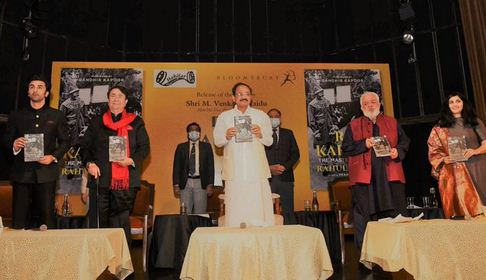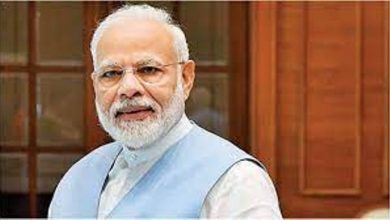Cinema is an important vehicle of our cultural diplomacy; it connects Indian diaspora with their roots back home: Vice President

The Vice President, Shri M. Venkaiah Naidu today said the purpose of good cinema is not just entertainment and urged filmmakers to make films that infuse a sense of ethics, morality, patriotism and humanity among the youth.
Addressing a gathering after releasing the book ‘Raj Kapoor: The Master at Work’ authored by well-known film director, Rahul Rawail in New Delhi today, the Vice President emphasized that cinema should be a vehicle with a higher purpose and motivate our youth to fight social evils such as casteism, corruption, gender discrimination and criminality.
Shri Naidu said that politicians, media and film makers have greater responsibility in maintaining standards and keeping the larger interests of the people in view of the decline in values in every sphere of life.
He also disapproved of the glorification of violence in films and use of ‘vulgarity’ and obscenity as it “impacts young minds negatively”. He said that cinema should create positive feeling in the minds of the people, particularly the youth. He also advised film makers to make cinema with passion keeping in mind the interests of the nation.
Noting that Indian films are watched world over, Shri Naidu highlighted that cinema has emerged as an important link culturally, connecting the vast Indian diaspora with their roots back home. “I would urge our filmmakers to avoid including such scenes in their movies which portray our great culture in poor light, or weaken the traditions, values and the ethos of our grand civilization,” he added.
The Vice President recalled that in the old good old days a film used to create a huge impact and run for weeks and months. He advised the younger generation of film makers to make every effort for ever-lasting impression with their films.
Shri Naidu complimented Shri Rahul Rawail and his co-author, Ms Pranika Sharma for bringing out this remarkable memoir of legendary filmmaker- Raj Kapoor, who is acclaimed as the greatest showman of Hindi cinema. Calling Shri Raj Kapoor a farsighted genius and versatile actor, Shri Naidu said that his contribution to the Indian film industry is immeasurable. “Most of Raj Kapoor’s films carried a crucial life lesson, depicted with great nuance and singularity. I truly miss the cinema of that era,” he added.
Praising Raj Kapoor as a team-builder of exceptional merit, Shri Naidu said that he had the unique knack of unearthing remarkable hidden talent in actors, composers, writers and lyricists. Noting that many of his memorable songs such as ‘Awara hoon’ remain hugely popular not only in India but in numerous countries across the world, the Vice President said that Raj Kapoor, through his films, turned Indian cinema into a vehicle of cultural diplomacy.
Observing that many of Shri Raj Kapoor’s films represent cinema for social consciousness, Shri Naidu underlined that, through the medium of cinema, he touched upon social changes like the growing obsession with money and consumerism, and the rapid decline of human values.
Commending Shri Rawail’s effort in putting together this tribute to his mentor, Shri Naidu said that his book is not simply for cinema enthusiasts and students of cinema but anyone who wants to learn more about the history of Indian cinema or even someone who simply enjoys watching films.
The Vice President also asked people to maintain all Covid-related protocols and get themselves vaccinated. As per the experts, vaccine is the only safety measure available along with maintaining a healthy and happy lifestyle, he added.
Well known film personality, Shri Randhir Kapoor, popular actor, Shri Ranbir Kapoor, columnist, Shri Suhel Seth, Ms Meenakshi Singh from Bloomsbury India, and others were present at the event which was held at India Habitat Center in National Capital.
Following are the excerpts from the speech –
“I am very pleased to be here with all of you to release this remarkable memoir of a legendary filmmaker acclaimed as the greatest showman of Hindi cinema, Raj Kapoor. Entitled Raj Kapoor: The Master at Work, this book is a labour of love authored by filmmaker Rahul Rawail and Pranika Sharma. Their admiration for the iconic producer, director and actor of yesteryears comes shining through in every single page of the book.
Shri Raj Kapoor was a farsighted genius whose pathbreaking films set a new trend in Hindi films of the fifties and sixties. As a creative filmmaker and an expressive actor, his contribution to the Indian film industry is immeasurable. The films he directed and produced had some of the most individualistic story lines with characters which were very true to life. Most of Shri Raj Kapoor’s films carried a crucial life lesson, depicted with great nuance and singularity. I truly miss the cinema of that era.
Shri Raj Kapoor’s early films showcase an influence of Charlie Chaplin and his character of the Tramp. Raj Kapoor’s persona of the tramp was simple, honest and endearing, leading to his worldwide popularity.
Barsaat (1949) Awaara (1951) and Shri 420 (1949) are among Raj Kapoor’s early films which were not only blockbusters at the box office but had timeless melodies which are popular even today. Shri Raj Kapoor, in his memorable filmmaking journey, had the unique knack of unearthing remarkable hidden talent in actors, composers, writers and lyricists. Importantly, he was a team-builder of exceptional merit. Be it the composer duo of Shanker-Jaikishen, the gifted poet Shailendra and his fellow lyricist, Hasrat Jaipuri, to cite a couple of examples, Shri Raj Kapoor gave us some of the brightest gems Hindi Cinema has known. The legendary singer Mukesh was to become Raj Kapoor’s voice adding to the worldwide popularity of songs from his films. Interestingly, memorable songs from his early films continue to be sung by people in many countries even today. In Russia and a number of Central Asian countries, they enjoy unparalleled appeal. The song ‘Awara hoon’ became hugely popular in numerous countries of the Middle East, Central Asia, China and Soviet Union. Shri Raj Kapoor, through his films, turned Indian cinema into a vehicle of cultural diplomacy.
Friends,
India is the largest producer of films. Our films are watched the world over. As you are aware, cinema has emerged as an important link culturally, connecting the vast Indian diaspora with their roots back home. Therefore, I would urge our filmmakers to avoid including such scenes in their movies which portray our great culture in poor light, or weaken the traditions, values and the ethos of our grand civilization.
Indian cinema is one of the most influential and powerful tools in addressing various social issues using the medium of a screenplay. Cinema has had a profound influence on each growing generation in India, through its realistic portrayal of how society views a range of social issues. Cinema, as we know, wields a powerful influence on popular imagination. Shri Raj Kapoor, as a filmmaker and actor, was acutely aware of this fact.
Dear friends,
I have always maintained that the purpose of good cinema is not just entertainment, rather it should be a vehicle with a higher purpose—a carrier of a social, moral and ethical message. The glorification of violence and use of vulgarity impacts young minds negatively. Instead, I would urge our filmmakers to make films that infuse a sense of ethics, morality, patriotism and humanity among the youth. Films should motivate our youth to fight social evils such as casteism, corruption, gender discrimination and criminality.
Many of Shri Raj Kapoor’s films represent cinema for social consciousness. Some of his films stood for the Indian youth, who, fresh out of British rule, were trying to come to terms with the changing reality of an emerging socio-economic situation. In Raj Kapoor’s early off-beat films like Boot Polish (1954) and Jaagte Raho (1956), for example, we find that the scripts were far ahead of his times. Even the lyrics of the songs in his films spoke of simple joys and fears of the common man. Be it Awaara, Shri 420 or Jis Desh Mein Ganga Behti Hai, every film touched upon social changes like the blurring of class culture, the growing obsession with money and consumerism, and the rapid decline of human values. This is also true of many films in which he played the lead role though he was not their producer—such as Anari and Chori Chori. The popular song, Jeena isi ka naam hai from Anari became the anthem of an entire generation and continues to ring in our ears to this day.
In this unique memoir, Rahul Rawail has shared memories of his time as an assistant director to Shri Raj Kapoor and the invaluable knowledge and experience that he gained during his time on the sets of cult hits such as Mera Naam Joker and Bobby. It transports the readers to the sets of these films and shows them the persona of Raj Kapoor, the filmmaker. This book also sheds light on some key technical aspects of Raj Kapoor’s films.
Along with the techniques that Shri Raj Kapoor used behind the camera, the book also sketches the history of R.K. Studios and provides us a glimpse into the personalities of various members of his crew, as also the eccentricities that were a part of Raj Kapoor’s personality. Rahul Rawail brings to life his personal experiences with the celebrated director, what he learnt under Shri Raj Kapoor’s tutelage and how he used that knowledge when he started making his own films.
Finally, this memoir captures the true essence of Raj Kapoor, the filmmaker, whom we also see as a teacher and guru to Mr. Rahul Rawail. It defines the influence that the renowned director had on Mr Rawail and how he helped him grow and become a truly inspiring filmmaker himself.
This book is a homage to Shri Raj Kapoor’s true passion—filmmaking and is an authentic account of how he lived and breathed cinema. Compelling and entertaining, the book is not just an important addition to film writing in India but can also be enjoyed by audiences of all ages and backgrounds.
I commend Shri Rawail’s painstaking effort in putting this tribute to his mentor together. What is even more fascinating to me is that Shri Rawail has had the help of someone young and passionate like Ms. Pranika Sharma to compile a book about an age of cinema that is not from this new digitalized era. This is an encouraging sign. Shri Rawail’s book is not simply for cinema enthusiasts and students of cinema but anyone who wants to learn more about the history of Indian cinema or even someone who simply enjoys watching films.

